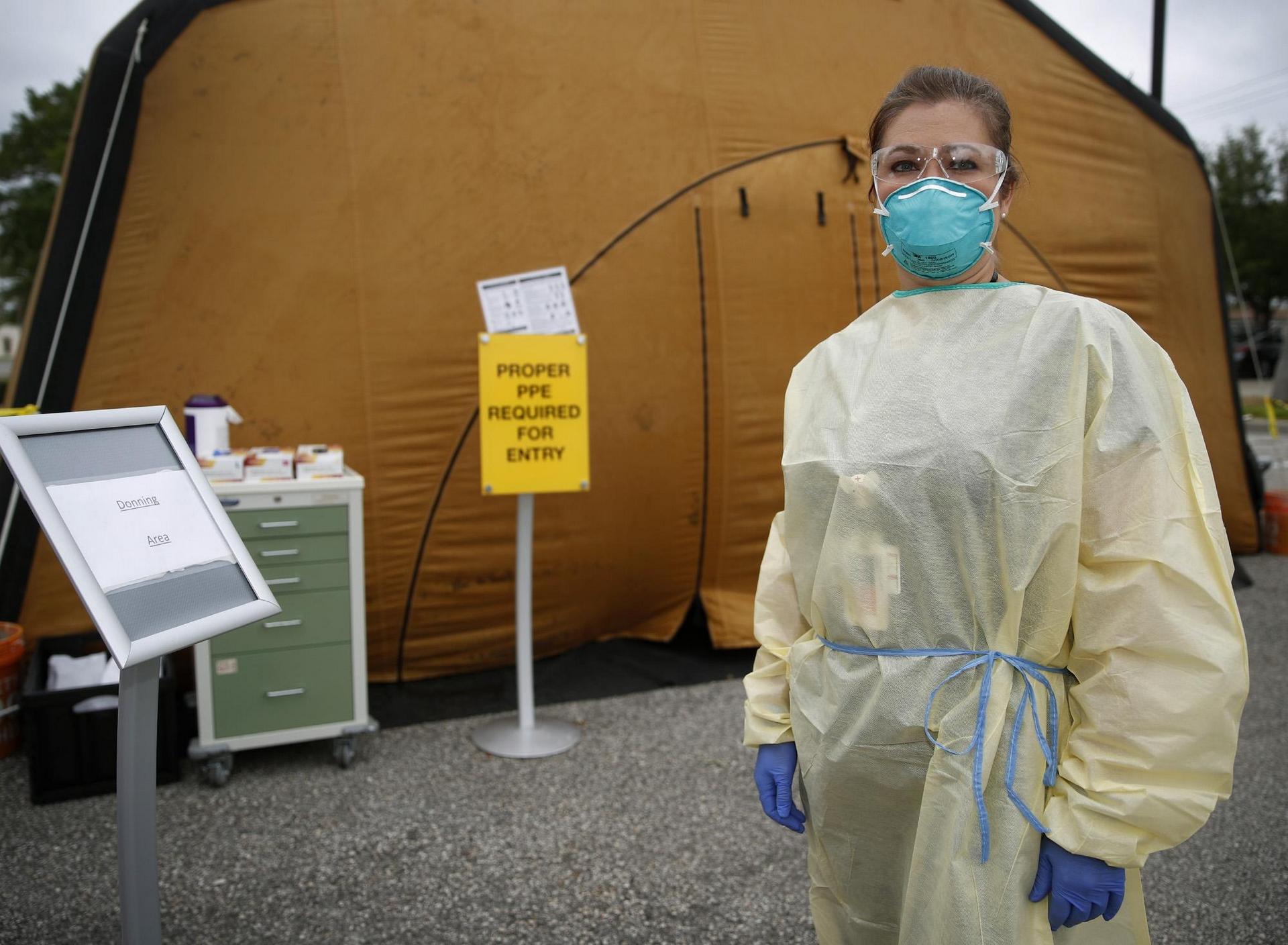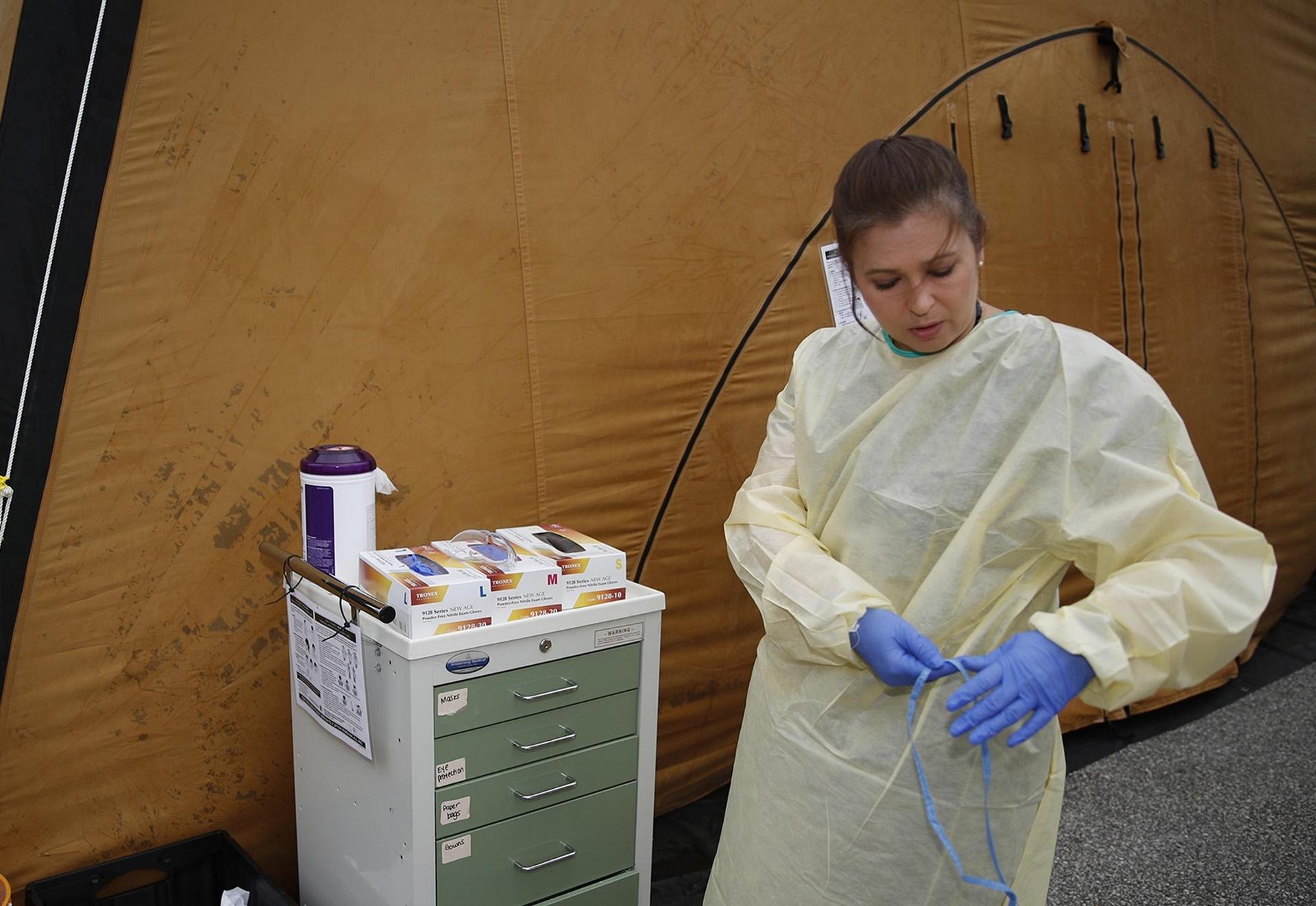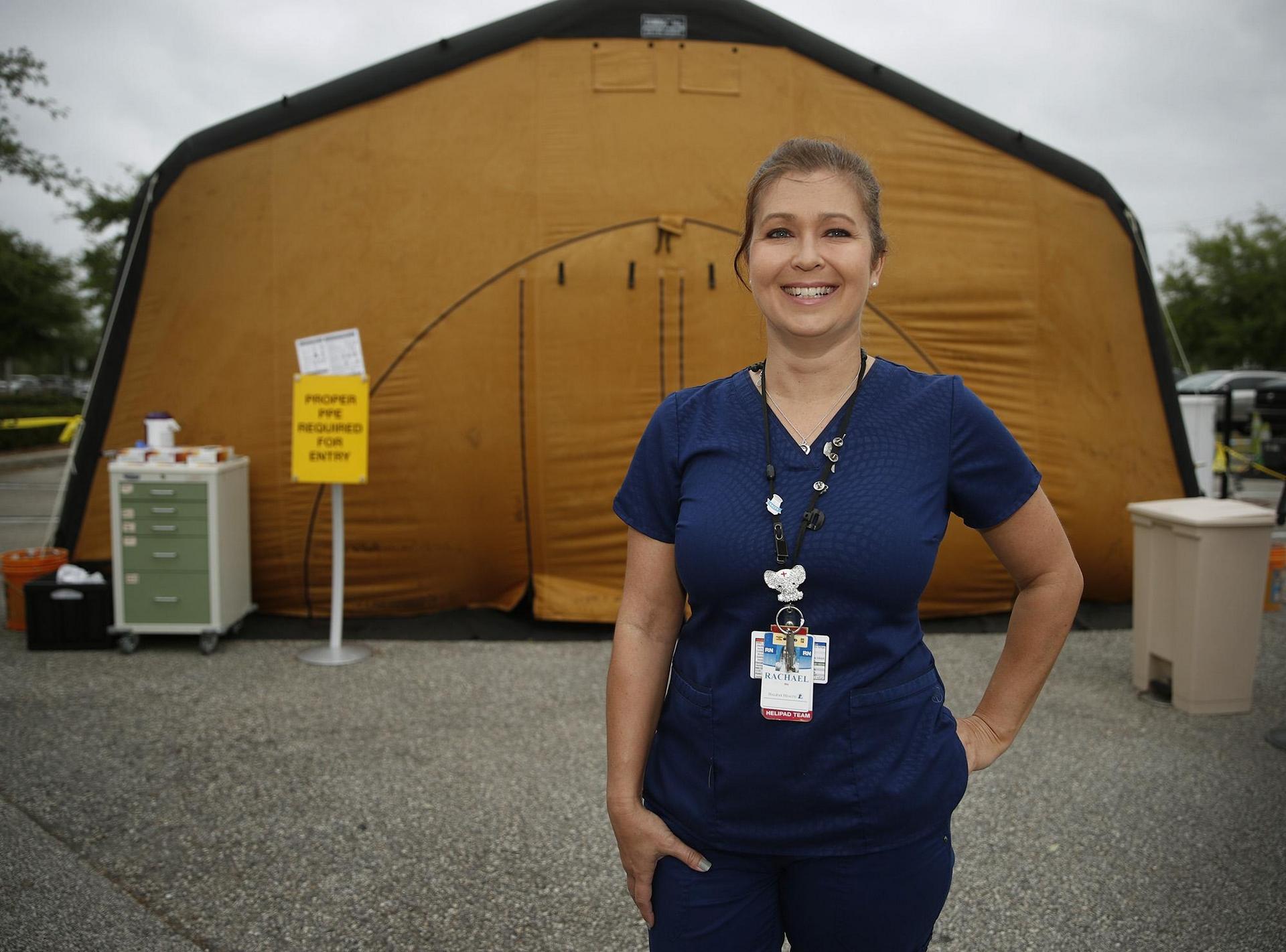‘When your healers are sick what do you do?’
In the beginning of 2020, a novel and deadly coronavirus began spreading across the world, forcing people to isolate from each other and avoid crowds. Our everyday lives changed, sometimes drastically. The Daytona Beach News-Journal’s Life in a Pandemic chronicles how the coronavirus is affecting people in Volusia and Flagler counties.
MARCH 28, 2020 — When Rachel Driscoll heads to work each morning as an emergency room nurse at Halifax Health Memorial Medical Center, she no longer goes inside the hospital.
Instead, she heads straight to the white-topped tent outside of the ER, pulls on her protective gown, slips on a pair of goggles, slides on surgical gloves and fits a mask over her mouth and nose.
Emergency room nurse Rachael Driscoll prepares to go into the testing tent at Halifax Health Medical Center in Daytona Beach where she will work every day for the foreseeable future. [News-Journal/Nigel Cook]
Then she waits for patients to come in who were stopped at the hospital’s entrance with a cough, fever and shortness of breath — all three symptoms of the potentially deadly coronavirus that is increasingly impacting the residents of Volusia County.
“I helped with the set-up of the tents, putting in the equipment and finding the best flow from the front door to the tent,” said Driscoll, 43, who spent seven years as a paramedic before switching to nursing. “Then I volunteered to be one of the primary nurses working the tent.”
Instead of her usual 12-hour shifts three days a week, Driscoll is now switching her schedule to 8-hour shifts five days a week.
She has many reasons for making a work choice others might avoid. She wants to be on the front lines. She wants to have control. She wants to help reduce staff members’ exposure to the virus, including pregnant nurses. She wants to help control the amount of protective equipment needed each day. She wants to alleviate fears.
But her biggest reason for volunteering to work in the tent she said is selfish.
Rachael Driscoll prepares to go into the testing tent outside Halifax Health Medical Center in Daytona Beach. [News-Journal/Nigel Cook]
“When I’m out at the tent, I’m protected because we suspect every person has the potential of having COVID-19,” she said, adding that she always has on protective equipment. “I know I am doing everything I can do to keep myself safe. Inside, people can be complaining of symptoms and it’s unknown if they have the virus. The patients that we don’t know about, that’s the scary part.”
But she’s worried they will run out of all the things that help her feel protected: the gowns, goggles, gloves and surgical masks.
“I’d be silly if I said no, I’m not worried,” Driscoll said. “If we have to sterilize equipment and reuse it, is it going to work? Is it going to keep me safe?”
The nurses, radiology staff and physicians in the tent can test for the flu and strep throat; take an X-ray of the patient’s chest; administer fluids for dehydration and treat symptoms. But not everyone who goes through the tent with coronavirus symptoms is being tested for COVID-19.
Driscoll said 90% of the patients who go through their tent are sent home within an hour with strict instructions to self-isolate for two weeks. The only exceptions are for patients who have underlying medical conditions.
“That scares me a little bit, too,” she said. “We do COVID-19 testing only when infectious disease doctors say yes.”
When Driscoll gets off work each day, she heads to her DeLand home she shares with her two adult sons and 4-year-old grandson.
Instead of just removing her shoes, she now removes all of her clothes and places them in a separate laundry bag before entering the house. Then she immediately takes a shower.
“I don’t know what I have on me. I don’t want to sit at the table and, God forbid, have something transferred to him,” she said, referring to her grandson.
Rachael Driscoll volunteered to work in the testing tent outside Halifax Health Medical Center in Daytona Beach because it ensures she is protected while at work from coronavirus. [News-Journal/Nigel Cook]
Around her home, things have changed. Their dining room table is now a preschool education table filled with science experiments, crafts and letter sheets. She’s helping her son by taking on the role as part-time teacher for her grandson.
Her home, which sits on a farm, used to be the “hangout” house with the gate wide open. Now their gate is locked everyday and only the family is allowed inside.
But Driscoll said they are keeping busy. They have an inflatable pool for her grandson, and she is tending a vegetable garden. Just the other day they went blueberry picking.
“One day this is going to be a good memory of us spending time together,” Driscoll said. “If none of us get sick, then we did it all right.”
But until that day comes, she’s still holding on to the fears surrounding the uncertainty of coronavirus.
“I think my biggest worry is that COVID-19 has no boundaries,” she said. “I worry: Do we have enough room at the hospital? Do we have enough staff? Do we have enough personal protective equipment for the staff?
“When your healers are sick, what do you do?”
NEXT: At Florida hotel, family confronts pandemic together
READ THE REST OF THE SERIES:
Working mom provides stability through crisis
Coronavirus has Volusia mayors, managers moving
For seniors, the coronavirus pandemic complicates and threatens life
Restaurant scrambles to survive
ER doctor: “Anything I can do to help, I will be there”
Subscribe to The Daytona Beach News-Journal.


